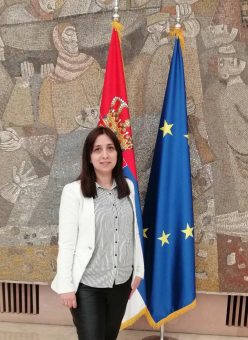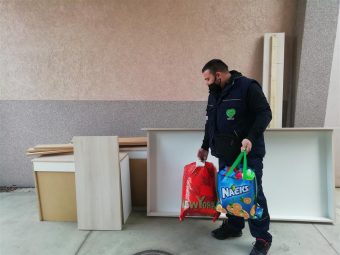
About 2.1 billion metric tons of solid waste are produced on Earth annually, of which 16 per cent is recycled. Unfortunately, as much as 46 per cent of global waste ends up in illegal landfills, in water or is burned. The fact that the situation in Serbia is not any better should not be emphasized. In our country, the amount of produced waste has doubled in the last ten years, and less than 10 per cent is recycled.
Fortunately, there are more and more individuals who have a clear picture of the current situation in the recycling field and society as a whole. Thanks to their excellent ideas, they offer us a solution to certain problems. Jelena Vidanović, project manager of the humanitarian service “Take away”, is trying to solve the problems of waste disposal and environmental protection in a unique way, but also to find an effective way to reduce the level of poverty of citizens, giving the incentive to employ people who do not have qualifications to work.
Humanitarian service “Take away” is a part of the project “Business instead of garbage” implemented by the Republican Union of Collectors of Secondary Raw Materials within the program “Support of the Swiss Government to the development of municipalities through the improvement of good governance and social inclusion – Swiss PRO”. The Government of Switzerland provides the main support in cooperation with the Government of Serbia. The program is implemented by United Nations Office for Project Services (UNOPS) in partnership with the Standing Conference of Towns and Municipalities (SCTM).
IN FOCUS:
- SOLUTION FOR MAINTAINING AND EXTENDING THE LIFE OF INDUSTRIAL BATTERIES
- NEW SOLAR MEGAWATT IN POŽAREVAC
- THE CHARGE&GO NETWORK IS EXPANDING!

“We believed that every problem is solvable and that we can and must turn detected irregularities into an opportunity that should be used to improve the socioeconomic condition primarily of all marginalized groups of citizens”, explains Vidaković.
Analyzing the current situation, Vidaković concludes that a large amount of communal waste is generated in the household. That waste often ends up next to street containers and in illegal landfills. What citizens define as waste are often actually things or raw materials that can be further used or recycled.
“By primary selection according to the ‘take it from the doorstep of the waste generator’ system, we prevent a large amount of valuable resources from ending up in the landfill. On the other hand, in the interaction with the citizens at the doorstep, the level of environmental awareness can be raised. Our experiences have shown that the concept of waste is relative and is closely related to the degree of the economic status of the individual and the degree of development of environmental awareness. Namely, in practice, it happens that, for example, a certain number of people want to get rid of a piece of furniture, textiles, or an outdated electrical device. While on the other hand, we have a poor group of people who would benefit from it to improve their poor living conditions. By taking over unnecessary things directly from the owner, we ensure the reuse of things, that is, we prevent them from becoming waste”, Vidaković points out.
Prepared by: Milica Radičević
Read the story in the new issue of the Energy portal Magazine RESPONSIBLE BUSINESS.



